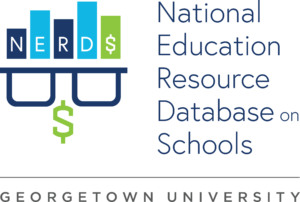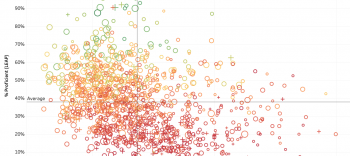Financial Transparency
Financial Transparency
Making per-pupil expenditures down to the school level public
The federal Every Student Succeeds Act (ESSA) requires states to annually report for every public school and local educational agency the total per-pupil spending of federal, state and local money disaggregated by source of funds for the preceding fiscal year. This includes actual (not average) spending on personnel.
NERD$ is the first-ever national dataset of public K-12 spending by school, compiling the data into one easy-to-access, permanent location.

Data Tools: Improving Financial Transparency

Spending v Outcomes by School
Take a deeper dive into the relationship between school spending and student outcomes with these interactive data visualizations.

School Spending & Outcomes Snapshot
View and print these data displays to inform conversations on improving equity and student outcomes.
Tracking the Utility and Usefulness of ESSA Reporting
State Education Agencies (SEAs) have assembled school-by-school per-pupil spending data to comply with ESSA’s financial transparency requirement.
Financial Decision-Making Working Group (FIDWiG)
Hosted by Edunomics Lab, FiDWiG is a collaboration between state education agencies (SEAs) on how to leverage financial transparency for data-driven decision-making. FiDWiG created a set of voluntary, minimal reporting criteria, the Interstate Financial Reporting, to ensure per-pupil expenditure measures have common meaning across states.
To learn more about this working group email us at edunomics@georgetown.edu.
Related Resources
- Articles & Publications
- Aug 09, 2023
Recipe for High-Impact Research
In this blog published by IES, the Edunomics Lab team shares lessons learned about making research more useful for practitioners, including designing visualizations and other tools around user needs to make data accessible, actionable, and impactful.
- Tools & Infographics
- Jul 13, 2023
The Grid: A Framework to Explore Budgeting Choices
This tool helps school, district, and state leaders strategically weigh investments by calculating per-student costs and spelling out desired results, risks involved, and how effectiveness will be measured.
- Tools & Infographics
- Jun 03, 2023
NERD$ Lessons Learned
Why NERD$? For decades, large financial datasets captured only district-level spending data. But districtwide averages, whether for performance, spending, teacher salaries, or other data points, mask variation at the school level within districts. As with many other industries and policy areas, the use of aggregated and/or average data in education finance obscures the factors that may […]
- Articles & Publications
- Apr 24, 2023
A Guide for SEA-led Resource Allocation Reviews
Resource allocation reviews (RARs) in districts that serve low-performing schools offer a new opportunity to examine the connection between resource allocation and academic outcomes. We've created guidance documents, templates, and tips to help SEAs prepare for and conduct RARs.

